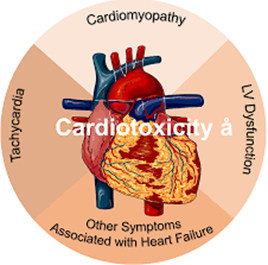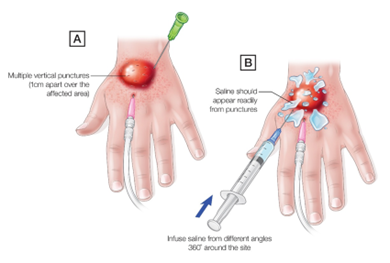A nurse is caring for a client who is receiving cisplatin, a platinum compound, as part of chemotherapy for lung cancer. The nurse should administer amifostine, a chemoprotective agent, to the client to protect which of the following organs from nephrotoxicity caused by cisplatin?
Liver
Kidneys
Heart
Lungs
Mucositis
The Correct Answer is B
Choice A reason:
The liver is not the organ that is protected by amifostine, a chemoprotective agent, from nephrotoxicity caused by cisplatin, a platinum compound that crosslinks DNA strands and prevents cell division. Cisplatin is used to treat lung cancer, a type of cancer that affects the respiratory system. The liver is not the primary target of cisplatin's toxicity, although it can cause hepatotoxicity in some cases. Amifostine does not prevent hepatotoxicity caused by cisplatin.
Choice B reason:
The kidneys are the organ that is protected by amifostine, a chemoprotective agent, from nephrotoxicity caused by cisplatin, a platinum compound that is used to treat lung cancer. Nephrotoxicity is a common and potentially serious adverse effect of cisplatin, which can cause acute or chronic renal failure, electrolyte imbalance, and metabolic acidosis. Nephrotoxicity is caused by the accumulation of cisplatin and its metabolites in the renal tubules, which leads to tubular damage and dysfunction. Amifostine can prevent or reduce nephrotoxicity caused by cisplatin. Amifostine is a prodrug that is converted to an active form by alkaline phosphatase in the normal tissues, but not in the tumor tissues. The active form of amifostine scavenges free radicals and protects the renal cells from oxidative stress.
Choice C reason:
The heart is not the organ that is protected by amifostine, a chemoprotective agent, from nephrotoxicity caused by cisplatin, a platinum compound that is used to treat lung cancer. The heart is not the primary target of cisplatin's toxicity, although it can cause cardiotoxicity in some cases. Amifostine does not prevent cardiotoxicity caused by cisplatin.
Choice D reason:
The lungs are not the organ that is protected by amifostine, a chemoprotective agent, from nephrotoxicity caused by cisplatin, a platinum compound that is used to treat lung cancer. The lungs are the primary site of action of cisplatin, as it kills the lung cancer cells. Amifostine does not protect the lung cancer cells from cisplatin's cytotoxic effect, as it does not reach them in its active form. Amifostine does not prevent pulmonary toxicity caused by cisplatin.
Nursing Test Bank
Naxlex Comprehensive Predictor Exams
Related Questions
Correct Answer is ["B","C"]
Explanation
Choice A reason:
Bone marrow suppression is a common and potentially serious adverse effect of doxorubicin, an anthracycline that intercalates into DNA and inhibits the enzyme topoisomerase II, resulting in DNA damage and cell death. Doxorubicin is used to treat breast cancer, a type of cancer that affects the breast tissue. Bone marrow suppression can cause leukopenia, anemia, and thrombocytopenia, which can increase the risk of infection, bleeding, and fatigue. Dexrazoxane, a chemoprotective agent, does not prevent bone marrow suppression caused by doxorubicin. The nurse should monitor the client's blood counts regularly and provide supportive care as needed.
Choice B reason:
Cardiotoxicity is a rare but serious adverse effect of doxorubicin, an anthracycline that is used to treat breast cancer. Cardiotoxicity can cause acute or chronic heart failure, arrhythmias, and myocardial infarction. Cardiotoxicity is caused by the formation of free radicals that damage the cardiac muscle cells. Dexrazoxane, a chemoprotective agent, can reduce cardiotoxicity caused by doxorubicin. Dexrazoxane is an iron chelator that scavenges free radicals and protects the heart from oxidative stress. The nurse should monitor the client's cardiac function before and during treatment with doxorubicin and administer dexrazoxane as prescribed.
Choice C reason:
Extravasation injury is a rare but serious adverse effect of doxorubicin, an anthracycline that is used to treat breast cancer. Extravasation injury is leakage of the drug into the surrounding tissue, which can cause severe pain, swelling, blistering, necrosis, and ulceration. Extravasation injury is caused by the vesicant property of doxorubicin, which means that it can cause tissue damage if it escapes from the vein. Dexrazoxane, a chemoprotective agent, can reduce extravasation injury caused by doxorubicin. Dexrazoxane can prevent or limit tissue damage by inhibiting the enzyme topoisomerase II in the skin cells. The nurse should monitor the infusion site carefully and stop the infusion immediately if extravasation occurs. The nurse should also administer dexrazoxane as prescribed and follow the institutional protocol for extravasation management.
Choice D reason:
Alopecia is a common and usually mild adverse effect of doxorubicin, an anthracycline that is used to treat breast cancer. Alopecia is hair loss that can affect the scalp, eyebrows, eyelashes, and body hair. Alopecia is caused by the cytotoxic effect of doxorubicin on the hair follicles. Dexrazoxane, a chemoprotective agent, does not prevent alopecia caused by doxorubicin. The nurse should provide emotional support to the client and educate them on how to cope with hair loss, such as using wigs, hats, scarves, or makeup.
Choice E reason:
Mucositis is a common and potentially serious adverse effect of doxorubicin, an anthracycline that is used to treat breast cancer. Mucositis is inflammation and ulceration of the mucous membranes that line the mouth, throat, esophagus, stomach, and intestines. Mucositis can cause pain, difficulty swallowing, nausea, vomiting, diarrhea, and infection. Mucositis is caused by the cytotoxic effect of doxorubicin on the rapidly dividing cells of the mucous membranes. Dexrazoxane, a chemoprotective agent, does not prevent mucositis caused by doxorubicin. The nurse should assess the client's oral cavity regularly and provide oral hygiene as needed. The nurse should also advise the client to avoid spicy, acidic, or hot foods and drinks; use a soft toothbrush; rinse with saline or baking soda solution; and use topical analgesics or mouthwashes as prescribed.


Correct Answer is C
Explanation
Choice A reason:
Hypertension and headache are not common adverse effects of filgrastim, a bone marrow stimulant that is used to treat neutropenia caused by chemotherapy. Filgrastim is a synthetic form of granulocyte colonystimulating factor (GCSF), a hormone that stimulates the production of neutrophils, a type of white blood cell that fights infection, in the bone marrow. Hypertension and headache may be caused by other factors, such as stress, pain, or dehydration.
Choice B reason:
Diarrhea and abdominal pain are not common adverse effects of filgrastim, a bone marrow stimulant that is used to treat neutropenia caused by chemotherapy. Diarrhea and abdominal pain may be caused by other drugs, such as antibiotics or antineoplastic agents, that affect the gastrointestinal tract.
Choice C reason:
Fever and flulike symptoms are common and usually mild adverse effects of filgrastim, a bone marrow stimulant that is used to treat neutropenia caused by chemotherapy. Fever and flulike symptoms can occur because filgrastim stimulates the immune system and causes the release of cytokines, which are substances that mediate inflammation and immune response. The client should report these symptoms to the provider and receive appropriate treatment, such as acetaminophen, fluids, and rest.
Choice D reason:
Bleeding and bruising are not common adverse effects of filgrastim, a bone marrow stimulant that is used to treat neutropenia caused by chemotherapy. Bleeding and bruising may be caused by thrombocytopenia, a condition that causes low platelet count and increases the risk of bleeding. Thrombocytopenia can be caused by chemotherapy, but it is not treated by filgrastim. Filgrastim does not increase the number of platelets in the blood, but it may increase the risk of splenic rupture, as more white blood cells can enlarge the spleen. The client should have their platelet count and spleen size monitored regularly and report any signs of bleeding or abdominal pain.
Whether you are a student looking to ace your exams or a practicing nurse seeking to enhance your expertise , our nursing education contents will empower you with the confidence and competence to make a difference in the lives of patients and become a respected leader in the healthcare field.
Visit Naxlex, invest in your future and unlock endless possibilities with our unparalleled nursing education contents today
Report Wrong Answer on the Current Question
Do you disagree with the answer? If yes, what is your expected answer? Explain.
Kindly be descriptive with the issue you are facing.
